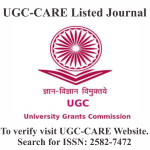UNDERSTANDING DIMENSIONS OF THE HOME LEARNING ENVIRONMENT AND PARENTAL INVOLVEMENT WITH TRIBAL CHILDREN AT FOUNDATIONAL GRADE: AN INSIGHTS FROM KANDHAMAL DISTRICT, ODISHA
DOI:
https://doi.org/10.29121/shodhkosh.v5.i6.2024.4974Keywords:
Home Learning Environment, Parental Involvement, Tribal Education, Foundational gradeAbstract [English]
This study explores the dimensions of the home learning environment and parental involvement in foundational years of learning of tribal children in Kandhamal District of Odisha. This paper gives emphasis on parents of children in grades 1 and 2 to assess the factors and dimensions of children learning opportunity available or provided by the parents. Through this micro study, the nature of parental engagement in foundational learning is also in part of observation. In addition to, the research sheds light on the challenges and opportunities faced by parents especially in the tribal context of Kandhamal. The study underlined the parental involvement with its related factors to strengthen early education. The respondents of the study were 30 randomly selected parents from 5 different schools and data was collected through self-designed a Likert-scale questionnaire and open-ended interview schedule. The study found that parents show a willingness to support their children's education with limited literacy skills and numeracy skills, lack of resources, and household responsibilities. The result revealed majority of 67% children depend on self-study and text books which is concern for further intervention and studies. The study provided a better insight on home settings, parental contribution, expectations and the area of improvement to be recommended.
References
Anene, G.U. (2005). Home Environment and the Academic Performance of a Child, Journal of Home Economics Research, 6(1), 99-100.
Anders Y., Rossbach H. G., Weinert S., Ebert S., Kuger S., Lehrl S., Von-Maurice J. (2012). Home and preschool learning environments and their relations to the development of early numeracy skills. Early Childhood Research Quarterly, 27(2), 231–244. https://doi.org/10.1016/j.ecresq.2011.08.003. DOI: https://doi.org/10.1016/j.ecresq.2011.08.003
Akrofi, O. (2020). Academic Achievement of Primary School Pupils: Investigating Home Environment Factors Contributing to Low Academic Performance. E-Journal of Humanities, Arts and Social Sciences, 1 (1), 49–57. DOI: https://doi.org/10.38159/ehass.2020061
Belsky J., Vandell L., Burchinal M., Clarke-Stewart A., Mc Cartney K., Owen T. (2007). Are there long-term effects of child care? Child Development, 78(2), 681–701. https://doi.org/10.1111/j.1467-8624.2007.01021.x DOI: https://doi.org/10.1111/j.1467-8624.2007.01021.x
Dietzman, T. M. (2002). The role of parental support in the home environment and student academic achievement, Submitted in Partial Fulfilment of the Requirements for The Masters of Science - School Guidance and Counseling at The Graduate College University of Wisconsin-Stout
Epstein, J. (2001). School, family, and community partnerships: Preparing educators and improving schools. Boulder, CO: Westview Press.
Karali Y., Aydemir H., Palancoglu O. V. (2022). Examining the factors affecting Turkey’s 4th-grade mathematics achievement according to TIMMS 2019 final report: The factors affecting Turkey’s 4th-grade mathematics achievement. International Journal of Curriculum and Instruction, 14(1), 424–454. https://ijci.wcci-international.org/index.php/IJCI/article/download/868/444
Ministry of Education. (2020). National Education Policy 2020. Government of India. Retrieved from https://www.education.gov.in
Ministry of Education. (2021). NIPUN Bharat: National Initiative for Proficiency in Reading with Understanding and Numeracy. Government of India. Retrieved from https://nipunbharat.education.gov.in
Ministry of Education. (2021). Unified District Information System for Education Plus (UDISE+) 2020-21. Government of India. Retrieved from https://udiseplus.gov.in
National Council of Educational Research and Training. (2022). National Curriculum Framework for Foundational Stage (NCF-FS) 2022. NCERT, Government of India. Retrieved from https://ncert.nic.in
National Council of Educational Research and Training. (2023). National Curriculum Framework for School Education (NCF-SE) 2023. NCERT, Government of India. Retrieved from https://ncert.nic.in
Skinner, E. A., & Wellborn, J. G. (1994). Coping during childhood and adolescence: A motivational perspective. In D. Featherman, R. Lerner & M. Perlmutter (Eds.) Life span development and behaviour. pp. 91-133. Hillsdale, NJ: Erlbaum. DOI: https://doi.org/10.4324/9781315789255-3
Save the Children. (2013). Emergent Literacy & Math at Home: Training of Trainers (TOT). Save the Children.
Office of the Registrar General & Census Commissioner. (2011). Census of India 2011. Ministry of Home Affairs, Government of India. Retrieved from https://censusindia.gov.in
Downloads
Published
How to Cite
Issue
Section
License
Copyright (c) 2024 Santosh Kumar Swain, Dr. Chhabinath Yadav

This work is licensed under a Creative Commons Attribution 4.0 International License.
With the licence CC-BY, authors retain the copyright, allowing anyone to download, reuse, re-print, modify, distribute, and/or copy their contribution. The work must be properly attributed to its author.
It is not necessary to ask for further permission from the author or journal board.
This journal provides immediate open access to its content on the principle that making research freely available to the public supports a greater global exchange of knowledge.




















